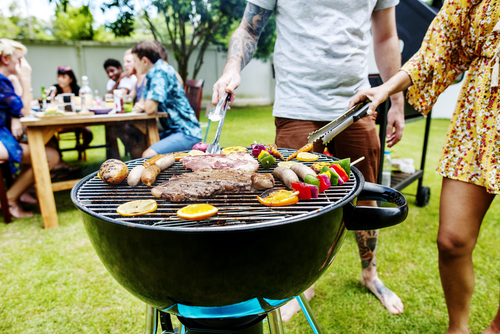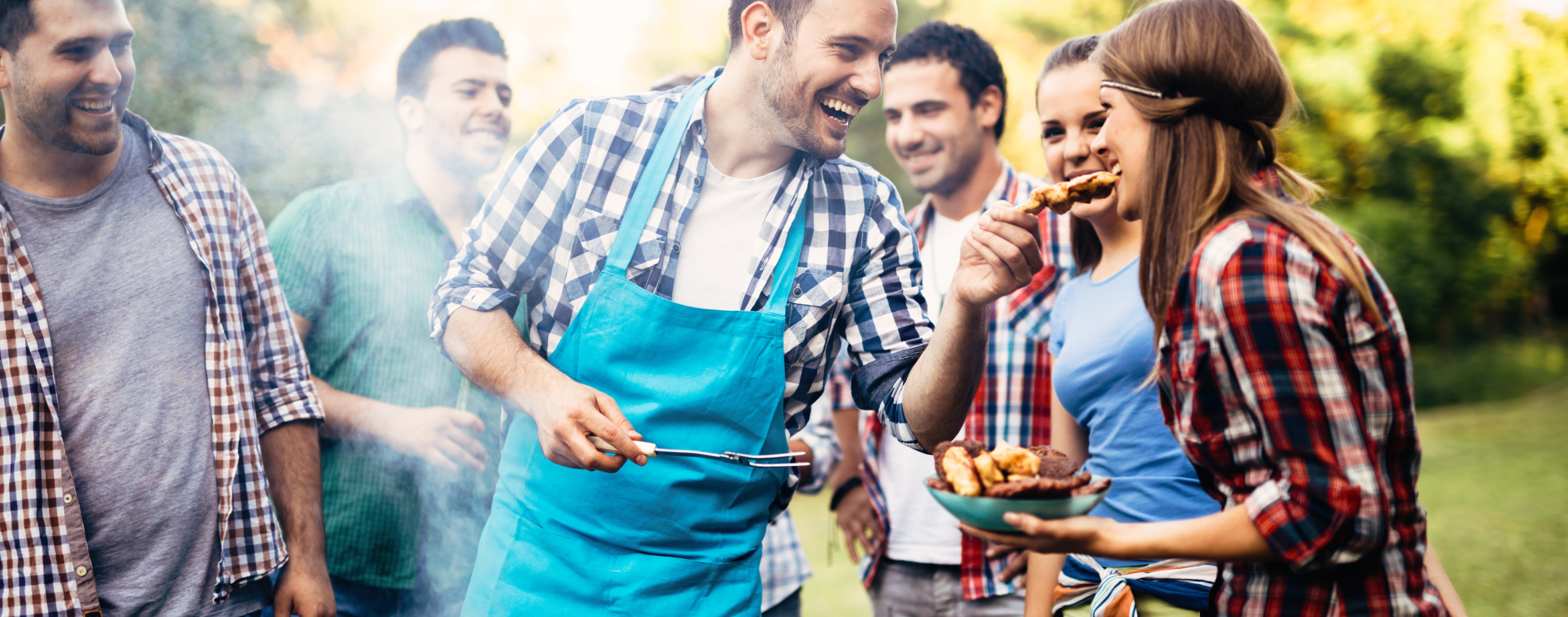With temperatures as high as 27C predicted in the next few weeks, according to WXCharts¹, it’s the perfect time of the year for BBQs and garden parties!
While BBQs are a fun and easy way to create memories, the negative impacts on our environment, such as discarded waste and carbon emissions, are easily overlooked when planning such an event.
With a recent 548% increase in monthly searches for ‘outdoor BBQ ideas’² suggesting the amount of BBQ-related waste is likely to rise in the UK, online caravan booking system UKCaravans4Hire.com has worked with experts to uncover ten easy ways to host a sustainable BBQ this summer.
- Plan the amount of food carefully
When organising a BBQ for a group, you need to consider dietary requirements and the number of people attending ahead of your food shop to reduce unwanted leftovers. Nick Yung, Head Chef at Straits Kitchen, Pan Pacific London, advises planning ahead to minimise food waste: “Try taking orders from guests in advance or checking in with them to give you an idea of what will be the most popular choice. If you end up with a surplus, consider providing eco-friendly, reusable containers so guests can take extras home the next day.”
Wayne Whoriskey, Managing Director of eco-friendly catering equipment company Go For Green, advises BBQ organisers to encourage guests to serve themselves, allowing them to choose the portions they can consume.

- Promote sustainable transportation
Considering the carbon footprint of multiple car journeys, multiple guests travelling to your BBQ can significantly impact the environment, so you should consider sustainable transport options ahead of the party.
“Encourage your guests to carpool or use public options when travelling to the BBQ if possible. Carpooling reduces the number of vehicles on the road, minimising carbon emissions. Alternatively, suggest using public transportation or organising a group bike ride to the BBQ location”, says Wayne.
Considerations around sustainable transportation don’t have to stop there: “By supporting local farmers, you reduce the carbon footprint associated with long-distance transportation. Visit farmers’ markets, local farm shops, or join a community-supported agriculture (CSA) program to access fresh, seasonal ingredients,” Wayne adds.
- Shop for sustainable produce
Food is the centrepiece of any good BBQ; making simple swaps in how you shop for ingredients can make huge environmental differences.
Nick suggests we should support local producers and farmers and choose pasture-raised, grass-fed meat instead of intensively farmed, mass-produced meat: “Eating local and sourcing local, fresh produce is always better for the environment, particularly for us, as British farmers are leading the way regarding sustainable food production.”
Lisa Marley, plant-based sustainable chef and nutrition coach, also recommends opting for delicious plant-based alternatives: “Veggie burgers, tofu skewers, or seitan steaks provide a sustainable alternative to traditional meat. You should also fill your BBQ with an assortment of colourful seasonal vegetables like courgette, bell peppers, aubergine, and corn on the cob. They are packed with flavour and have a low carbon footprint.”
- DIY your own sustainable sides and drinks
Buying pre-packaged and mass-produced drinks and sides to complement your delicious BBQ mains is not a sustainable option due to the carbon footprint of the factories which create these.
Lisa suggests complementing your BBQ with sustainable side dishes and salads: “Choose organic, locally grown produce and incorporate grains, legumes, and fresh herbs for added nutrition and flavour.”
According to Wayne, there are also plenty of ways to provide more sustainable drink options: “Avoid single-use plastic bottles and sugary drinks by offering homemade refreshments. Infused water, freshly squeezed lemonade, or iced tea are excellent choices. You should also consider reusable jugs or drinks dispensers and provide reusable polycarbonate glasses instead of disposable glasses.”
- Opt for a sustainable BBQ grill

With recent studies showing that almost two in five (39%) Brits think disposable BBQs should be banned³, there are many ways BBQ hosts can make more sustainable choices.
“Metals used in traditional BBQ grills can take up to 200 years to decompose. With this in mind, one of the best ways to make your BBQ sustainable is to ditch the metal disposable BBQs from the corner shop in favour of an entirely recyclable and compostable version,” says Holly Thomson, Food Editor at sustainability-focused cookware and recipe inspiration company Sous Chef.
Nick Yung also urges the importance of sustainable charcoal: “If you are using charcoal, choose a UK-grown, sustainably sourced variety. Lots of charcoal you buy on the high street is made from unsustainable wood and has chemicals added.”
- Invest in eco-friendly grilling tools
The tools you use to cook your meat (or meat-free) options are just as important as the grill itself and can be the difference between a low or high-environmental-impact BBQ.
Wayne suggests investing in eco-friendly BBQ tools and accessories: “Look for utensils made from sustainable materials like bamboo or stainless steel, as they are reusable and long-lasting. Replace disposable tin foil with reusable grill mats or non-stick grilling baskets and use washable and biodegradable cleaning brushes instead of plastic ones.”
- Maximise heat energy when grilling
While there are debates about the best way to grill meat on a BBQ – and every person has their preference – you should try and maximise the heat energy to reduce the carbon footprint of your food.
Meat thermometers are a tool often forgotten about when planning a BBQ, but according to Jason Webb, Managing Director at Electronic Temperature Instruments Ltd, these are a great tool to reduce food waste: “Where a lot of recipes refer to timings, the difference in ovens and settings on gas BBQs can produce different temperatures. Not only does achieving the right temperature save energy, time and money, it also ensures a consistency in quality, reducing food waste.”
- Avoid single-use plastic
As a host, you are responsible for setting the table, so make sure you avoid plastic where possible! Studies show that 90% of the 2.7 billion items of single-use cutlery used each year by Brits (most of which is plastic) must be recycled responsibly.⁴
“Plastic waste is a significant environmental concern. Choose reusable plates, cutlery, and cups instead of disposable ones. If disposable items are necessary, opt for recyclable and compostable cutlery, plates and bowls alternatives made from plant-based materials,” Wayne advises.
Lisa also advises using plastic-free alternatives for prepping your meat or veggies, such as glass containers or reusable silicone bags.
- Dispose of waste responsibly

Composting is an effective way to divert organic waste from landfills and create nutrient-rich soil for your garden, according to Wayne: “Set up a compost bin or heap in your backyard to dispose of fruit and vegetable scraps, coffee grounds, and other biodegradable waste generated during the BBQ. If you don’t have a garden, consider donating the compost to local community gardens or urban farming initiatives and provide clearly labelled recycling bins educating guests about proper waste segregation or ‘binfrastructure’ too.”
If you’re having a BBQ away from home, remember to dispose of your waste responsibly and do not leave it behind! Just because you’re not at home doesn’t mean you can’t set up temporary recycle bins or take food back to compost.
- Respect the local environment
If you choose a park or nature reserve for your summer BBQ, one of the most critical sustainable acts is simply respecting the environment around you, ensuring that the natural environment stays as pristine as you found it. Wayne adds: “Avoid sensitive habitats, protected areas, or areas prone to wildfires and respect nature by leaving no trace behind.”
Gareth Irving, CEO at UKCaravans4Hire.com, said: “Embracing sustainable BBQs and holidays in the UK isn’t just a trend; it’s a crucial responsibility. By opting for eco-friendly grilling practices and supporting local communities and businesses, we can contribute to preserving the natural wonders that make our country so breathtaking.
“From savouring locally sourced ingredients to reducing carbon emissions with sustainable travel, we can create a brighter, greener getaway that helps save our planet for our future generations.”
For more information about how to enjoy a sustainable BBQ, please visit: https://www.ukcaravans4hire.com/blog/sustainable-bbq.





